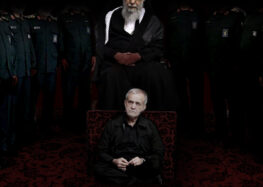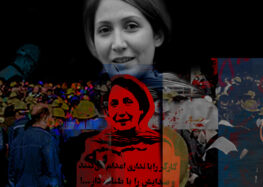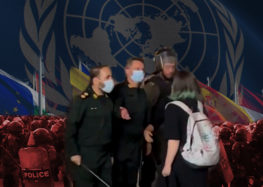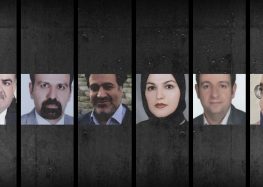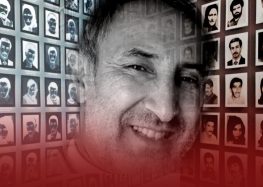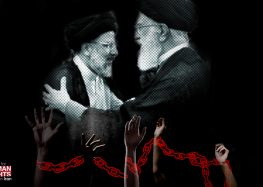Iran Elections: Reformists Win Voter Support Despite Roadblocks and Irregularities
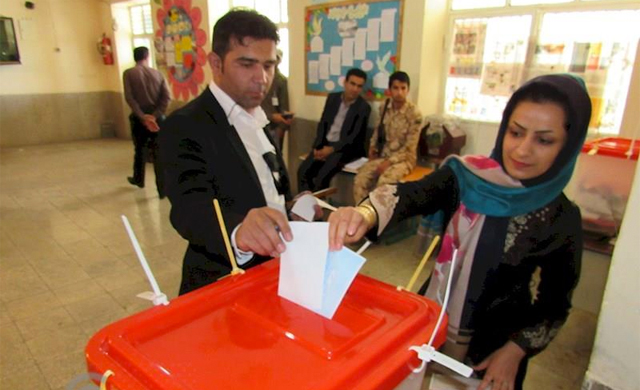
While facing non-stop impediments, reformists and centrists achieved significant gains in Iran’s recent elections, even after hardline bodies broke the law to prevent candidates close to President Hassan Rouhani from winning voter support.
In addition to exhausting legal channels to prevent unfavorable candidates from running, the hardline Guardian Council, which vets all candidates, illegally enlisted the Revolutionary Guards’ Intelligence Organization to investigate candidate applications ahead of the February 26, 2016 elections for Parliament and the Assembly of Experts.
Article 46 in Chapter 5 of the Election Law stipulates that the Guardian Council can only refer to four sources to investigate the qualification of candidacy applicants: the Intelligence Ministry, the Prosecutor General, the National Registry, and the Police Criminal Identification Office in collaboration with Interpol.
The Guardian Council’s spokesman, Nejatollah Ebrahimian—whose resignation was rumored after thousands of registrants were disqualified—exposed the Council’s illegal move in an unprecedented interview on March 4 with the Etemad daily.
The biggest problem the Council faced, revealed Ebrahimian, was that they simply did not have enough time to pry into the lives of the more than 12,000 registrants. That was also why they were unable to properly respond to the roughly 6,000 applicants who appealed their disqualification, he said.
“You cannot investigate 6,000 complaints within 20 days based on insufficient reports. The law says you must give individuals a chance to present their defense. Even if there were only a thousand appeals, there was not enough time to look into them,” said Ebrahimian.
“You need at least a year to investigate the qualifications. Not just 20 days. If we are going to judge people’s beliefs and commitment to religion in addition to their education, age and judicial records, it cannot be done in 20 days,” he added.
Ebrahimian blamed the Council’s “shortcomings” on its ultra-conservative chairman, Ayatollah Ahmad Jannati: “Our work had some defects. The work was under the supervision of the esteemed chairman of the Council of Guardians and the deputy in charge of the elections. Not all Council members were involved. In other words, the chairman was in charge of planning and meetings.”
Ebrahimian comments revealed that the Council was so desperate to block reformist wins that they resorted to breaking the law.
“Is it beneficial to get security organizations other than the Intelligence Ministry involved, or would that be considered undue meddling? I did not know the answer in practice but now I can say it is beneficial but only when you have time and judicial expertise to investigate these cases,” said Ebrahimian.
“The election executive boards [set up by the Guardian Council] might say someone is not qualified to become a candidate because of a criminal record, or that he’s not a committed religious person, or for other reasons. Local neighborhood investigations might reveal one thing, then the IRGC [Revolutionary Guard’s] Intelligence Organizations says another thing and the Intelligence Ministry says something else,” he added.
According to Article 23 of Iran’s Constitution, “The investigation of individuals’ beliefs is forbidden, and no one may be molested or taken to task simply for holding a certain belief.”
Ebrahimian even compared the Council’s investigations to an “inquisition.”
“I know that in a theocracy it’s necessary to check the religious commitment of those who want to hold office but we should do so without setting up an inquisition,” he said.
Roadblocks
Reformist candidates were also prohibited from organizing political gatherings and attacked by pressure groups months before the elections.
Police and security forces did nothing to prevent attacks by radical conservative groups while the activities of popular reformist figures were severely limited.
On February 18, Mostafa Kavakebian, a Tehran Member of Parliament and leader of the moderate Mardomsalari Party, was attacked by pressure groups and forced to leave Abuzar Mosque where he was planning to give a campaign speech.
After the incident the Mardomsalari Party issued a statement saying in part: “Shouldn’t the police, the security forces and the Interior Ministry guarantee the safety of gatherings…organized by approved candidates? Should religious centers such as mosques be under the control of groups belonging to certain factions? That same Abuzar Mosque is where many others had made speeches even before the election campaign got started.”
The Etemad newspaper’s political desk also reported election campaign violations against the reformists on February 20: “In the past few months, there have been numerous reports of speakers being disrupted. Fayaz Zahed in Lahijan, Ali Shakouri-Rad and Rasoul Montajabnia in Karaj, Azar Mansouri in Yasouj, Elaheh Koulaie in Arak, as well as other political figures. In the past few days, legal gatherings by reformists in Isfahan and Shiraz were canceled because of attacks by vigilantes. This has been going on since the election campaign got started. In Tehran’s 16th District, Shahrbanoo Amani’s speech also had to be canceled because of a group [of vigilantes].”
In addition, images of reformist former President Mohammad Khatami were banned from appearing in the country’s official media, as hardliners sought to stamp out the public presence of this extremely popular figure in Iran. They were unsuccessful only due to the former president’s huge presence on social media networks.
Ballot Tampering
Provincial authorities also initially delayed announcing results without reason in Iran’s second-largest city of Mashhad, raising suspicions of voter fraud.
“We don’t deserve the suffering imposed on us by your governor general and administrators in Khorasan Razavi Province… Mashhad is not a city. It’s a prison. We were not allowed to make speeches in any mosques or hold political campaign meetings… We delivered the highest number of votes to you in Friday’s most glorious election. Now we ask: Why have are our votes been taken hostage? Why are they delaying the announcement of people’s votes?” reformist activist Nasser Amoli wrote from Mashhad in a letter to President Hassan Rouhani.
The results were postponed for two days, sparking protests.
Alireza Rashidi, the governor general of Khorasan Razavi province where Mashad is located, said the results would not be announced “until all the votes have been collected in the central system.”
When the results were finally published, conservative and extremist parliamentary candidates were declared victorious.
Reza Mansouri, the deputy governor, wrote off the suspicions as misplaced hope: “Some had completely unrealistic expectations of the election results based on reports in cyber networks.”
But Mashhad’s reformists questioned the legitimacy of the results in a statement: “It is very difficult to precisely determine what happened in Mashhad’s elections due to suspicious delays imposed by the province’s officials in collecting and counting votes… We will promise voters that we will lodge our objections to the relevant authorities based on available evidence.”
“Initially the conservatives were ahead in the vote count but then the reformists, led by Dr. [Hossein] Amini, rose to the top,” wrote Ghanoon newspaper. “This prompted strong objections from the conservatives and in the end when the final results were announced, all the reformist candidates on the ‘List of Hope’ [reformist and centrist candidates backed by Rouhani and Khatami] were left out of the winner’s list. This did not end all the rumors [of fraud] but rather intensified them.”
Officials have denied reports of a possible recount in Mashhad. The province’s Political Affairs Deputy Mahmoud Karimi told the semi-official Mehr News that a recount would only take place if a candidate lodges a complaint and the election monitoring committee gives the go-ahead.
What Happened in Karaj?
The election results were also only announced after long delays in Karaj, Iran’s fourth largest city in Alborz Province.
Two conservative candidates were ultimately declared victorious, but they did not receive the mandatory minimum of 25 percent of the votes to enter Parliament. Only after more than 75,000 of the 630,000 votes cast in Karaj were declared void did the conservative candidates meet the mandatory minimum to become MPs.
“The Parliamentary Election Law states that in the first round of the elections, candidates need at least 25 percent of the total votes to win…so why is it that the voting results in Karaj were announced after eliminating nullified votes against the law? Shouldn’t the four top candidates have competed in the second round instead?” asked Ghanoon newspaper.
Jannati’s Suspicious Vote
The Guardian Council also disqualified many reformist and pro-Rouhani registrants for the Assembly of Experts, the clerical body that will likely choose Iran’s next supreme leader. Nevertheless, a list of 17 Assembly candidates in Tehran, put forward by centrist former President Akbar Hashemi Rafsanjani, managed to defeat hardline candidates, namely the ultra-conservative Ayatollahs Mesbah Yazdi and Mohammad Yazdi, the current outgoing Speaker of the Assembly of Experts.
Ayatollah Ahmad Jannati, the chairman of the Guardian Council, and a key ally of Iran’s supreme leader, Ali Khamenei, was the only conservative candidate to win a seat in the Assembly of Experts from Iran’s capital city of Tehran.
Jannati came in last (17th) in the vote tally, but only barely, and some say miraculously.
Ayatollah Sajjadi Ataabadi, the only candidate on Rafsanjani’s list who did not win a seat, has formally requested a recount “to remove any suspicions about the validity of the elections.”
The question that is now being raised is: how can the Guardian Council fairly make a ruling when Jannati is its chairman?
Doubts have also been raised about the results of the Assembly of Experts’ elections in Kurdistan Province, where Mamousta Faegh Rostami and Mamousta Anvar Adami were initially declared winners on February 27. But that result was rejected a day later as incomplete and eventually Khamanei’s representative in Kurdistan, Ayatollah Seyed Mohammad Hosseini Shahroudi, was declared the second winning candidate instead of Mamousta Anvar Adami.
Shahroudi supposedly received more than 133,000 votes and yet Adami was initially reported to have received more than 136,000 votes.
Vote Buying
Mehr News has reported at least 85 cases of election violations, including vote buying.
Siamak Rahpeyk, the spokesman for the Election Monitoring Central Headquarters, also confirmed that “a limited number of reports had been sent to the Council of Guardians regarding vote buying.”
Interior Minister Abdolreza Rahmani Fazli had warned about the impact of “dirty money” on the elections last year.
According to MP Avaz Heydarpour from the city of Shahreza, parliamentary campaign costs had shot up from two billion rials (about $66,000 USD) to around five billion rials (about $166,000 USD).
“Being in politics is expensive these days,” Heydarpour told the reformist Shargh newspaper. “You can’t enter the arena [without money].”
Reports of people being transported to other cities to boost votes have also surfaced. IranWire, which is run by Iranian journalists living abroad, published a letter attributed to Hedayatollah Jamalipour, the political affairs deputy of Tehran Province, about transferring voters from Qom to Tehran.
Hojatoleslam Rasoul Montajabnia also claimed that extremists had held secret meetings to bring one million voters to Tehran.

